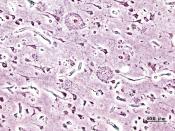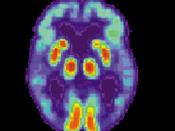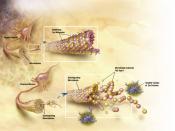Introduction Alzheimer's Disease is a progressive and irreversible brain disease that destroys mental and physical functions. It is the fourth leading cause of adult death in the United States. The average life expectancy of a person with the disease is between five and ten years, some patients can live up to 15 years due to the improvements in medical treatments.
Learning about Alzheimer?s disease and realizing that it is much more that just a loss of memory can benefit the families of those with the disorder as well as society as a whole. The purpose of this paper is to look at the disorder, as well as to discuss the history, symptoms, diagnosis and hopes of a cure for Alzheimer?s disease.
History Alzheimer?s disease was first described by Alois Alzheimer as a progressive deterioration of intellect, memory and orientation. As a neuropathologist, Alzheimer studied the case a 51 year-old woman.
When she died, Alzheimer performed an autopsy and found that she had ?cerebral atrophy? (deterioration of the brain), ?senile plaques? (protein deposits) and ?neurofibrillary tangles? (abnormal filaments in nerve cells) in her brain -- three common pathological features of those who have Alzheimer?s Disease (Ramanathan, 1997).
Today, as research on Alzheimer's disease progresses, scientists are describing other abnormal anatomical and chemical changes associated with the disease. These include nerve cell degeneration in the brain's nucleus and reduced levels of the neurotransmitter acetylcholine in the brains of Alzheimer's disease victims (Alzheimer?s Disease). However, from a practical standpoint, conducting an autopsy of an individual to make a definitive diagnosis is rather ineffective.
Symptoms The progression of Alzheimer?s disease is classified into three phases: forgetfulness, confusion, and dementia. The forgetfulness phase is the first stage and is characterized by a loss of short-term memory. Patients in this phase will often have trouble remembering...


